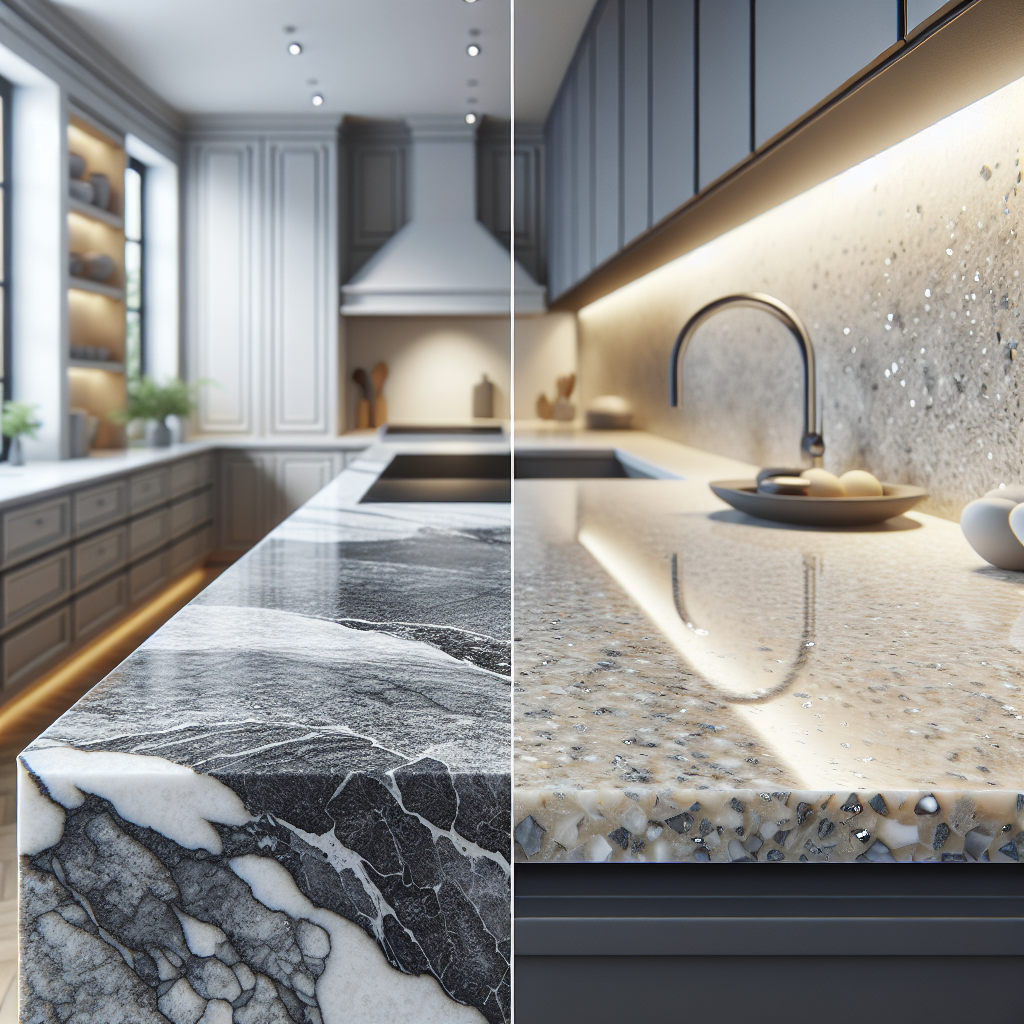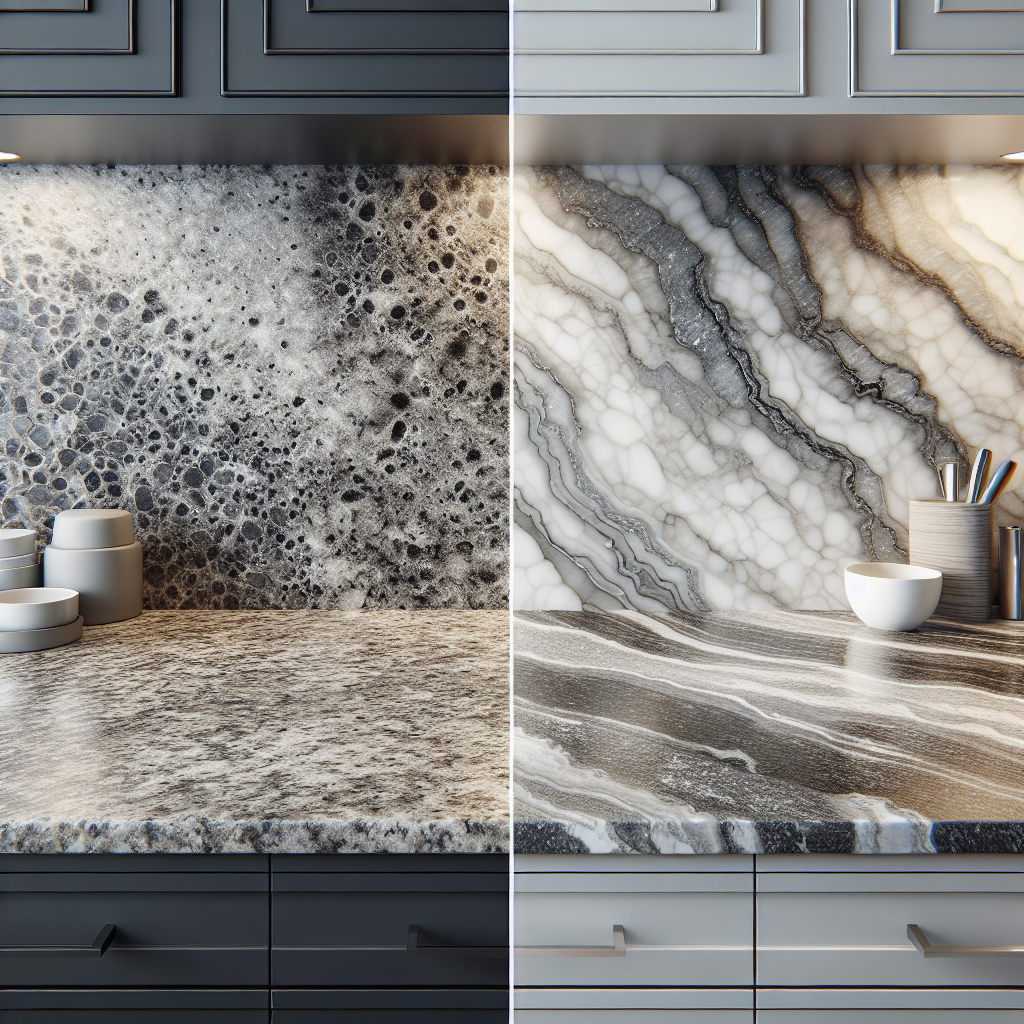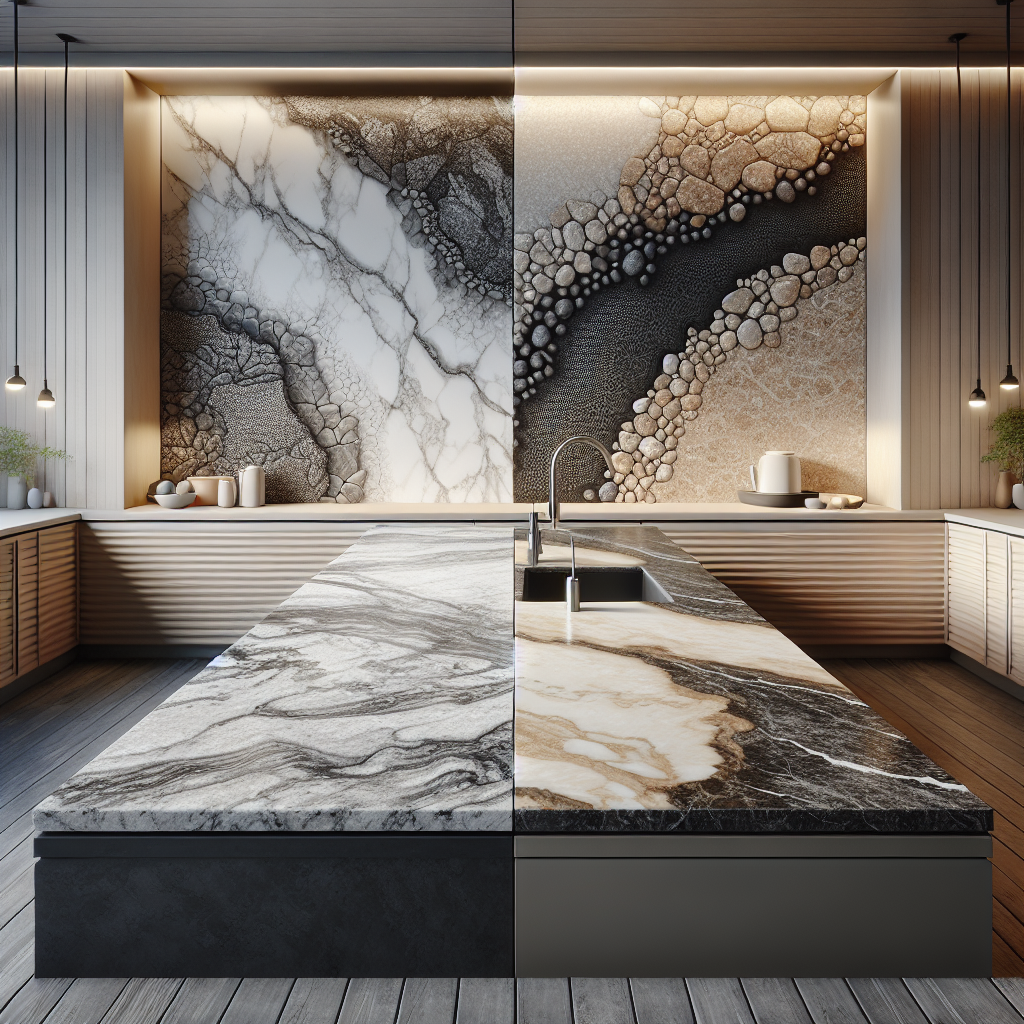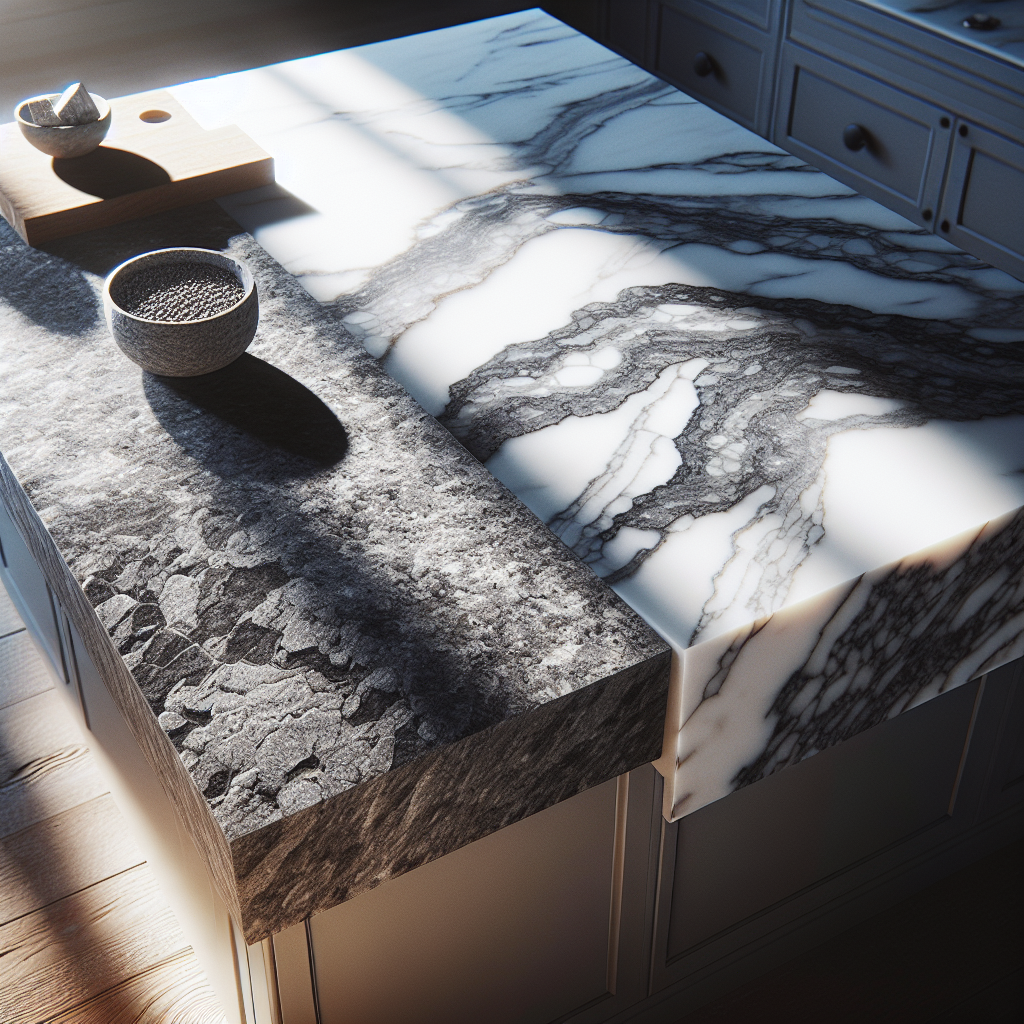When it comes to designing your dream kitchen, selecting the right countertop material is crucial. Among the most popular choices are granite and quartz, two materials that offer both aesthetic appeal and functionality. Each has its unique characteristics and benefits, making them highly favored by homeowners and contractors alike. Granite, a natural stone, is renowned for its rich, earthy tones and distinctive patterns that add a touch of elegance to any kitchen space. On the other hand, quartz is engineered from natural quartz crystals and resin, providing a uniform appearance and a vast array of color options.
Understanding the differences between these two materials can help you make an informed decision for your kitchen renovation. Granite is cherished for its natural beauty and heat resistance, while quartz is praised for its non-porous nature and low maintenance requirements. Both materials offer durability and style, but your choice ultimately depends on your specific needs and preferences.
At Absolute Marble and Granite, we specialize in the fabrication and installation of exquisite countertops crafted from both granite and quartz. Our experienced craftsmen are dedicated to delivering solutions that enhance the aesthetic appeal and functionality of your kitchen. Call us today at (954) 781-7370 for a free quote or visit our website at Absolute Marble and Granite to explore our extensive range of countertop options.
Comparing Granite and Quartz Durability
When evaluating countertop options, durability is a critical factor to consider. Both granite and quartz are renowned for their strength, yet they exhibit different characteristics when it comes to resilience. Granite, being a natural stone, is incredibly tough and can withstand high levels of wear and tear, making it ideal for busy kitchens. Its resistance to heat and scratches is a testament to its robust nature, although it is advisable to use cutting boards and trivets to maintain its pristine surface.
In contrast, quartz countertops, while also durable, are engineered with a blend of natural quartz crystals and resins. This composition results in a non-porous surface that is resistant to stains and bacteria, offering a significant advantage in terms of hygiene and maintenance. However, quartz can be more susceptible to heat damage compared to granite, so it is important to avoid placing hot pots and pans directly onto its surface.
Both materials can last for decades with proper care, making them excellent choices for any kitchen project. The decision between granite and quartz may ultimately hinge on the specific demands of your household and the level of maintenance you are willing to undertake. By understanding the durability aspects of both materials, you can make an informed choice that aligns with your kitchen’s functional and aesthetic needs.
Maintenance Requirements of Granite and Quartz

Understanding the maintenance requirements of granite and quartz is essential in determining which material is best suited for your kitchen. Granite countertops, while stunning and durable, require regular sealing to maintain their resistance to stains and moisture. The porous nature of granite means that without proper sealing, it might absorb liquids and oils, leading to potential staining. However, with routine care, including sealing every 1-2 years and using mild cleaning solutions, granite can retain its beauty and functionality for many years.
On the other hand, quartz countertops offer a low-maintenance alternative. Since they are engineered to be non-porous, they do not require sealing, making them more convenient for those who prefer minimal upkeep. Cleaning quartz is straightforward; a simple wipe with soap and water or a gentle surface cleaner is usually sufficient to keep it looking immaculate. This ease of maintenance makes quartz particularly appealing for busy households or those seeking hassle-free countertop care.
While both granite and quartz have their advantages, your choice may depend on how much time and effort you are willing to invest in maintenance. For those who appreciate natural stone and don’t mind the extra care, granite can be a rewarding choice. Meanwhile, quartz provides a practical solution for those prioritizing ease of maintenance without sacrificing style and elegance.
Cost Considerations for Granite and Quartz

When contemplating the best material for your kitchen countertops, cost considerations play a significant role. Both granite and quartz are premium options, but they come with different price points and factors that can influence the total cost.
Granite countertops are typically priced based on the rarity and origin of the stone. Exotic and rare slabs can significantly increase the price, while more common varieties offer a more budget-friendly option. The cost of granite also includes potential expenses for sealing and regular maintenance to preserve its longevity and appearance.
In contrast, quartz countertops are generally priced more consistently since they are engineered stone. The price of quartz can be influenced by brand, color, and finish, but it usually lies within a similar range to mid-level granite options. One of the financial benefits of quartz is its low maintenance cost, as it doesn’t require sealing or special cleaners, which can translate to savings over time.
Installation costs for both granite and quartz should also be factored into your budget. Due to the heavy weight and precise cutting required, professional installation is recommended for both materials. This ensures the best fit and finish, contributing to the overall cost.
Ultimately, the decision between granite and quartz may come down to how much you are willing to invest upfront versus long-term maintenance. Whether you prefer the natural allure of granite or the engineered perfection of quartz, understanding these cost considerations can help you make an informed choice for your kitchen design.
Aesthetic Differences Between Granite and Quartz

The aesthetic appeal of your kitchen is a vital consideration when choosing between granite and quartz countertops. Each material offers distinct characteristics that can enhance the overall look and feel of your space.
Granite is renowned for its natural beauty and uniqueness. As a natural stone, each granite slab is one-of-a-kind, featuring varied patterns, veining, and color tones that add a touch of elegance and sophistication to any kitchen. The organic look of granite can complement a variety of design styles, from rustic to traditional, offering a natural warmth and rich texture that many homeowners find irresistible. Its ability to provide a distinctive focal point makes it a popular choice for those desiring a unique aesthetic.
On the other hand, quartz offers a more consistent and uniform appearance, which appeals to those who favor a sleek, modern, and contemporary look. Since quartz is an engineered stone, it is available in an extensive array of colors, patterns, and finishes, including options that mimic the look of natural stones, such as marble or granite. This versatility allows quartz to seamlessly integrate into various kitchen designs, providing a clean and polished look that appeals to minimalist and modern aesthetics alike.
When considering aesthetic differences between granite and quartz, it’s essential to align your choice with your personal style preferences and the overall design theme of your kitchen. Whether you are drawn to the natural allure of granite or the refined elegance of quartz, both materials can significantly elevate the visual appeal of your kitchen space.
Conclusion: Choosing the Right Material for Your Kitchen

In making the decision between granite and quartz for your kitchen countertops, it is crucial to weigh the pros and cons of each material in relation to your personal taste and lifestyle needs. Granite offers a timeless appeal with its natural beauty and unique patterns, making it an excellent choice for those who appreciate the charm of organic materials. Its durability and heat resistance are ideal for active kitchens.
In contrast, quartz provides a more contemporary and uniform look, appealing to those who prefer a polished and modern aesthetic. Its non-porous nature and low maintenance make it a practical option for busy households. Quartz is perfect for homeowners who seek a wide range of color and pattern choices while enjoying the benefits of an engineered stone that does not compromise on style.
Ultimately, the decision comes down to your specific requirements and the overall design vision for your kitchen. Whether you are captivated by the natural elegance of granite or the versatile modernity of quartz, both materials offer outstanding quality and beauty that can transform your kitchen space.
If you’re ready to explore the possibilities and need expert guidance, contact Absolute Marble and Granite. Call us today at (954) 781-7370 for a free quote and let our experienced team help you choose the perfect countertop solution to enhance your kitchen’s aesthetic and functionality.
